Australian Renewable Fuels Week - 18-22 March 2024
Accelerating decarbonisation of Australia’s hard to abate sectors.
NSW DPI was a proud sponsor of Bioenergy Australia’s Renewable Fuels Week in Canberra which was an exciting opportunity to accelerate the significant potential of Australia's Renewable Fuel sector in supporting decarbonisation of Australia’s hard to abate sectors including agriculture. The week-long event include a two-day conference, which brought thought leaders, decision-makers, and researchers together to examine the key opportunities and challenges of the industry. The aim of Australian Renewable Fuels Week was to foster the renewable liquid fuels and renewable gas sectors to generate jobs, secure investment, minimise waste and environmental impact, and deliver a decarbonisation pathway for Australia’s hard to abate sectors. The following recordings and interviews serve as a legacy to the event and agency support.
Australian Renewable Fuels Week Videos
Full recordings of the Australian Renewable Fuels Week sessions
| Day 1 | Day 2 |
|---|---|
| ARFW Day 1 Session 1 | ARFW Day 2 Session 1 |
| ARFW Day 1 Session 2 | ARFW Day 2 Session 2 |
| ARFW Day 1 Session 3 | ARFW Day 2 Session 3 |
| ARFW Day 1 Session 4 | ARFW Day 2 Session 4 |
Exploring Beyond (fossil) Diesel: webinar series
The ‘Exploring Beyond Fossil Diesel’ webinar series looks at options for powering agriculture in a way that lowers carbon emissions.
With over 80% of the energy used in agriculture coming from diesel, the series looks at technologies that allow us to move away from reliance on fossil diesel.
Initially the series looked at replacement options for diesel power, such as electric tractors, methane gas powered tractors and hydrogen power.
However, the existing level of investment in diesel machinery, its long life all and limits to the supply of alternatives (and the infrastructure needed to support that change), means diesel engines will be operating well into the future.
So, we explored changing the fuel going into existing diesel engines as a practical solution. While several options have merit it seems renewable diesel offers a way to largely decarbonise without changing machinery.
Renewable diesel (like sustainable aviation fuel) is made by recycling carbon already in the system, (without extracting fossil carbon from the ground). It requires no alterations to engines and is warranted by engine manufacturers. It can reduce life cycle emissions by almost 90%.
Several sessions look into renewable diesel: to understand what it is, and its benefits and emission levels compared with changing to electric power, etc. (webinars #4-7).
From this exploration, renewable diesel appears to be a practical way to reduce emissions without major changes to existing machinery as it is a drop-in replacement. Availability of renewable diesel is growing worldwide, and Australia has a significant opportunity to build regional production capacity that can create regional employment and reduce reliance on imported fuel, all while decarbonising hard to abate sectors!
Renewable diesel can be made from biological material (fats, oils woody materials, etc.), and there is often confusion between it and older style biodiesel, as they can be made from the same materials. However, earlier style biodiesel is better named ‘FAME biodiesel´ (Fatty Acid Methyl Ester) and is made by a transesterification process. This makes a fuel that is not ‘a drop-in replacement’ but can be used as a blend (usually 5%).
This can be a practical start to decarbonising diesel fuel supplies but is limited to a small percentage gain, unlike renewable diesel which offers greater levels of carbon reduction. *More detail on the differences between FAME biodiesel and renewable diesel are covered at the end of the article.
Learnings from the Series
- Electric tractors/machines can be viable where workloads are light, sporadic or broken up over time, (e.g. motorbikes, side by sides, smaller tractors or larger tractors with sporadic use and/or time to charge between uses).
- Electric machinery will have difficulty meeting the high HP long duration requirements typical of cropping systems.
- In many areas the power needed to charge electric batteries (be it grid or local solar) can be a limit when looking at larger HP requirements. Also, the source of electricity used to charge batteries influences the emissions gains possible, e.g. charging with power from a coal fired power station reduces emissions benefits.
- Gas powered tractors/machinery can suit some situations, especially where local gas supplies are generated.
- Hydrogen fuel cells have potential but availability and cost of both machine and fuel (and its infrastructure) remain a block.
- FAME biodiesel and renewable diesel can be made from the same feedstock.
- FAME biodiesel has chemicals in it that mean it is usually used as an additive to other diesel e.g. a blend of 5%.
- Unlike early versions of biodiesel, current FAME biodiesel and renewable diesel meet
international fuel standards. Early biodiesel experiences have tainted the acceptance of newer biodiesel, as many people know of a vehicle running on diesel made from old café cooking oil that caused engine issues. - Renewable diesel is chemically indiscernible from fossil diesel so is a ‘drop in’ replacement needing no changes or modifications.
- It can be made by several different feedstocks and by various processes. These can be from existing materials like fats/oils/wood, etc. (bio fuels) or by building hydrocarbon molecules (e-fuels).
- A supply of green hydrogen is needed during production to achieve its low carbon potential.
Where to find the Exploring Beyond (fossil) Diesel webinars
Watch previous webinars on the Tocal College courses website
Biodiesel and Renewable Diesel: What’s the Difference?
Source: Gerveni, M., T. Hubbs and S. Irwin. "Biodiesel and Renewable Diesel: What’s the Difference?" farmdoc daily (13):22, Department of Agricultural and Consumer Economics, University of Illinois at Urbana-Champaign, February 8, 2023.
Biodiesel, often referred to as FAME biodiesel or simply FAME, is produced by a process known as transesterification (FAME stands for Fatty Acid Methyl Ester). Transesterification converts organic fats and oils into fatty acid alkyl esters by reacting them with alcohols and catalysts. Methanol typically serves as the reactant and creates fatty acid methyl esters. During the transesterification process, vegetable oil or fat is typically reacted with methanol to produce biodiesel and glycerol. Glycerol can be used in animal feeds or a variety of chemical processes.
Pure FAME biodiesel created from this process is known in the industry as B100. It is important to emphasize that FAME is not a hydrocarbon fuel like petroleum diesel and, therefore, differs from petroleum diesel in several key aspects. First, FAME biodiesel contains oxygen which causes FAME to have approximately seven percent less energy by volume. Second, the higher oxygen content of FAME can limit the length of time it can be stored due to oxidation that causes corrosion. Third, FAME’s chemical composition can make it more susceptible to microbial fouling when poor storage tank management is present, which may result in the corrosion of storage tanks and clogging of fuel lines. Fourth, FAME biodiesel has a relatively high temperature where it will begin to freeze and form visible crystals — a condition known as ‘gelling.’ Once gelling occurs, the solidified fuel will not flow through fuel lines. For these reasons, FAME biodiesel is blended with petroleum diesel for final consumption. Common blends include B5 (up to 5 percent biodiesel) and B20 (6 to 20 percent biodiesel).
In addition to some of the challenges facing the use of biodiesel, it provides other positive aspects for users. For example, biodiesel has desirable lubricity characteristics due to its chemical composition. This feature helps prevent premature engine wear. Renewable diesel is fundamentally different from FAME biodiesel in that it only contains hydrogen and carbon, making it a hydrocarbon fuel just like petroleum diesel. While not identical to petroleum diesel, renewable diesel is so close that it is considered a ‘drop-in’ replacement for petroleum diesel. In other words, renewable diesel does not need to be blended with petroleum diesel for it to be used as a ‘spec’ fuel in modern diesel engines. The drop-in nature of renewable diesel is a significant advantage over FAME biodiesel.
Renewable diesel does have a somewhat lower energy content compared to petroleum diesel (four percent less by volume), but this may be offset by other desirable properties of renewable diesel.
Exploring Beyond Diesel webinars
Agricultural production relies on many energy sources; the dominant one is diesel. Diesel usage generates many millions of tonnes of CO2 related gases every year. If we are to achieve significant reductions in human related emissions, an alternative to fossil fuel diesel will be needed. This series of free online forums explores alternatives and transitions for production systems that are possible beyond diesel reliance.
Accessibility alert
Some of the PDF presentations on this page are not accessible and cannot be made so. To receive an accessible explanation contact climatechangestrategy@dpi.nsw.gov.au
Exploring Beyond fossil Diesel forum #7
Exploring Beyond (fossil) Diesel #7 webinar in this series was held on 16 May 2023. Rose Amal, University of NSW Scientia Professor of Chemical Engineering, discussed Power to X (P2X) - combining green hydrogen with carbon to make renewable fuels, and with air and water to make fertilisers. NSW Farmers ex-President James Jackson provided ag insights on the discussion.
Watch a recording of the online webinar here.
View or download a DPI P2X presentation (PDF, 4035.16 KB) from the webinar.
Further information on the Exploring Beyond Diesel series can be found on the Tocal College Courses Website
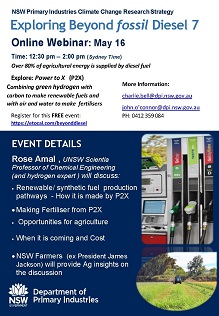
Exploring Beyond fossil Diesel forum #6
Exploring Beyond (fossil) Diesel #6 webinar in this series was held on 15 September 2022. Chair of the Cleaner Fuel Alliance, Simon Roycroft, discussed the potential for renewable diesel use both globally and here in Australia. Simon has just received the first shipment of renewable diesel (HVO100) into Australia, which is exciting news in the scheme of fuel, and he is passionate about its potential.
Watch a recording of the online webinar presentation here.
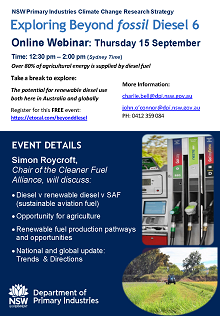
Exploring Beyond fossil Diesel forum #5
Exploring Beyond (fossil) Diesel webinar #5 was held on 13 April 2022 and looked at improvements in diesel engines and an Australian group developing renewable (no/low carbon) diesel.
Watch a recording of the online webinar presentation here.
Download the presentation Renewable Low Carbon Fuels Boost the Future for Diesel(PDF, 15401.53 KB)
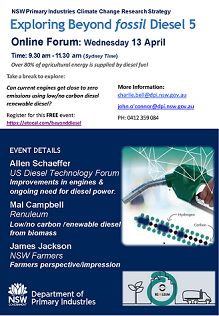
The article 'Can diesel fuel farming forever?' from the May-June 2022 edition of NSW Farmers 'The Farmer' magazine contains a discussion of alternatives to diesel for on-farm use, including biodiesel, renewable diesel, hydrogen, electrification and methane. Turn to page 36 of the magazine to view the article.
Exploring Beyond Diesel forum #4
Exploring Beyond Diesel forum #4 was held on 18 August 2021. Nathan Gore-Brown from MOV3MENT Consultants discussed the findings of a report(PDF, 1741.56 KB) for NSW DPI that explores diesel reliance and transition options.
Watch a recording of the online webinar presentation here.
Download the presentation Diesel Use in Agriculture & Opportunities to Support Net Zero Emissions(PDF, 2692.06 KB)
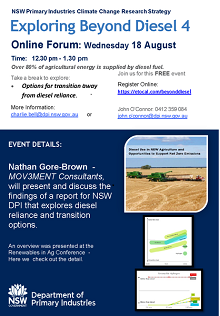
Exploring Beyond Diesel forum #3
The third Exploring Beyond Diesel online forum was held on 11 November 2020 and explored 'low or zero carbon fuel options'.
Watch a recording of the Forum Three presentations:
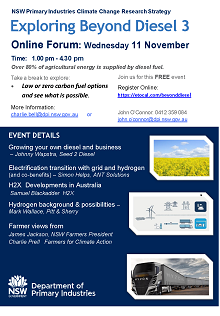
Exploring Beyond Diesel forum #2
The second in this series of seminars exploring this theme was held on 2 September 2020. This session looked at the New Holland T6 tractor and its development along with businesses that are developing in Australia to generate methane for industrial uses, one of which may be replacement of diesel. We explored where methane gas may fit into the future power mix.
Download a PDF or watch a recording of the Forum Two presentations:
Session 2: Methane Power - Ben Mitchell, New Holland (PDF, 11923.24 KB)
Watch recording Session 2
Watch recording Session 3: The Imperative and Challenges - James Jackson, President NSW Farmers
Session 7: Hydrogen Power Developments - Neil Thompson, Director Australian Hydrogen Council (PDF, 1250.63 KB)
Watch recording Session 7
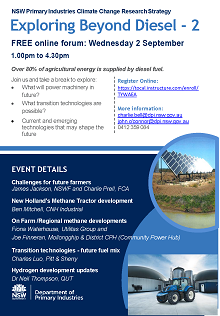
Exploring Beyond Diesel forum #1
Exploring Beyond Diesel forum #1
The first in this series of seminars was held on 10 July 2020 and explored emerging future technologies.
Download PDF or watch a recording of the Forum One presentations:
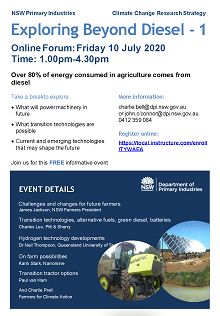
Farm energy forums: energetic opportunities in the 21st century - taking it to the farm
N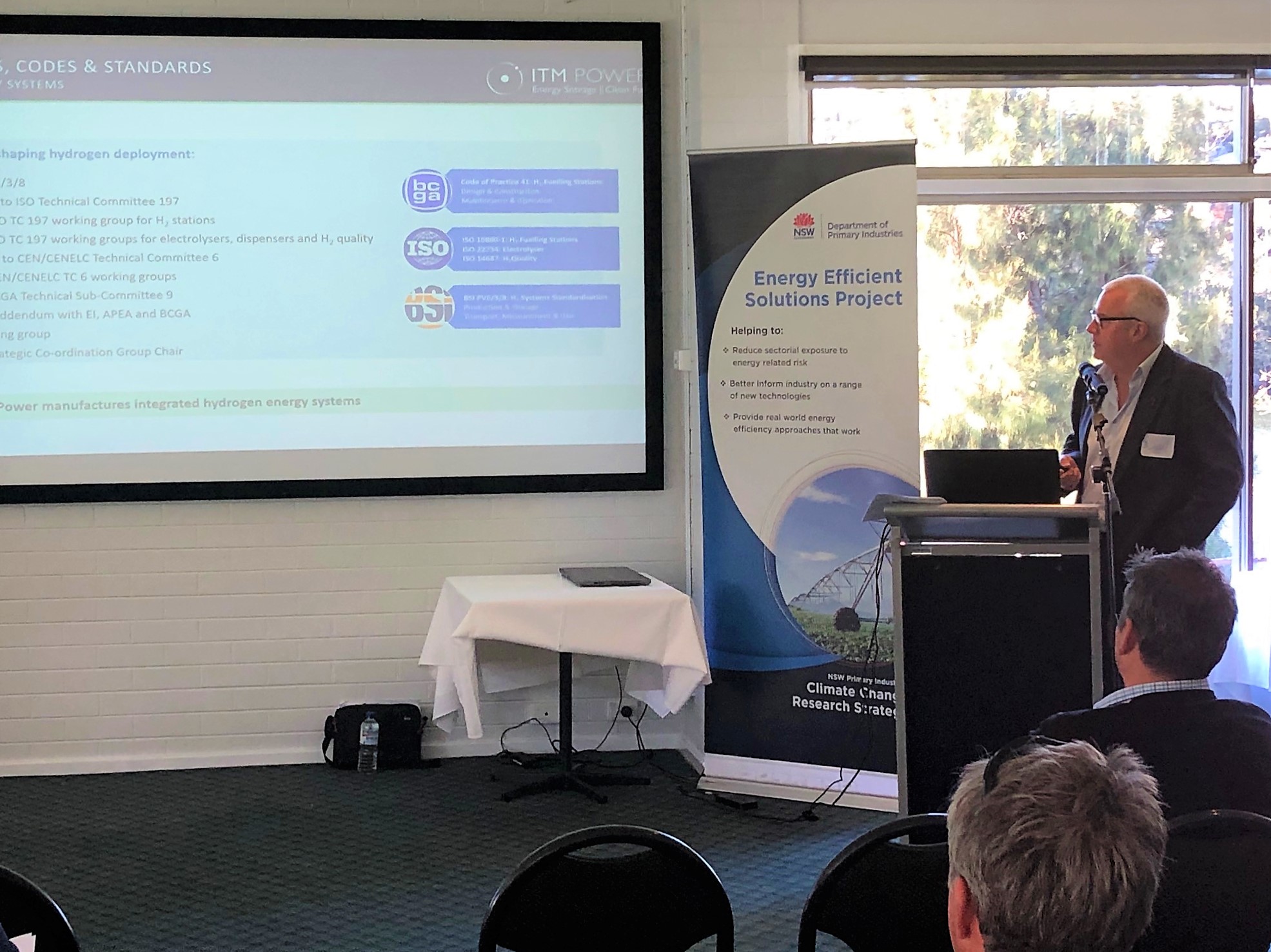 SW DPI, in conjunction with various branches of government and industry, host a series of large rural community forums focusing on energy related opportunities for the agricultural sector in the 21st Century. The forums are organised and supported by funds from the energy related Climate Change Fund (CCF) projects and are tailored to meet regional interests and needs.
SW DPI, in conjunction with various branches of government and industry, host a series of large rural community forums focusing on energy related opportunities for the agricultural sector in the 21st Century. The forums are organised and supported by funds from the energy related Climate Change Fund (CCF) projects and are tailored to meet regional interests and needs.
These forums provide a comprehensive overview on farm energy use and highlight its impact on profitability both now and into the near future, with costs expected to rise. The forums explore where improvements in efficiencies can be achieved and the potential to improve overall energy productivity for each sector. The forums have brought together leading minds from business, government and the university sector to explore the issue, its causes and potential opportunities for agriculture using existing regionally relevant information wherever possible.
Farm Energy Forum presentations
Farm Energy Forums were held in the South Coast and Murray River regions during 2019 and the following PDF presentations are available to download:
South Coast (Bega & Nowra) 20-21 June 2019
- Energy Efficiency Solutions Project Overview - Michael Cashen / John O'Connor (PDF, 1793.05 KB)
- Integrated Hydrogen Energy Systems for Agribusiness - Neil Thompson (PDF, 1843.09 KB)
- Understanding Electricity - Lee Stewart (PDF, 4588.87 KB)
- Reviewing Your Energy Options - Nick Bullock (PDF, 5295.06 KB)
- Agriculture Applications of Batteries - Charles Luo (PDF, 1326.85 KB)
- Energy Efficient Irrigation - Dave O'Donnell PDF, 1934.35 KB
- Dairy Energy Data - Bega Cheese Ltd (PDF, 147.46 KB)
- South Coast Forums Programs (PDF, 521.15 KB)
Murray (Corowa, Finley, Buronga) 27-29 August 2019
- Energy Efficiency Solutions project overview - Michael Cashen / John O'Connor (PDF, 1293.51 KB)
- Integrated Hydrogen Energy Systems - Neil Thompson (PDF, 3868.71 KB)
- Japan's Hydrogen Society Roadmap - Neil Thompson (PDF, 1662.31 KB)
- Understanding Electricity: the grid, usage & cost - Luke Christiansen (PDF, 6303.35 KB)
- Agriculture Applications of Batteries - Charles Luo (PDF, 1846.56 KB)
- Solar Pumping Options - Luke Christiansen (PDF, 3507.24 KB)
- Energy Efficient Irrigation - Dave O'Donnell (PDF, 2929.59 KB)
- Waste Recovery: biomethane use - Ian Longford, Rivalea Piggery (PDF, 2981.01 KB)
- Waste Recovery: biogas solutions - Matt Hayden (PDF, 4108.72 KB)
- Energy & Electricity in Regional NSW - Julia Jelbart NSW Farmers (PDF, 925.2 KB)
- Reaqua Solar Pumping - Bill Leys (PDF, 2219.17 KB)
- Environmental Upgrade Agreements - Mildura Rural City Council (PDF, 659.96 KB)
- Murray Forums Programs (PDF, 651.05 KB)
For project information please contact:
John O'Connor, Research Officer, Energy, Department of Primary Industries and Regional Development
Phone: 0412 359 084 | Email:john.o’connor@dpi.nsw.gov.au